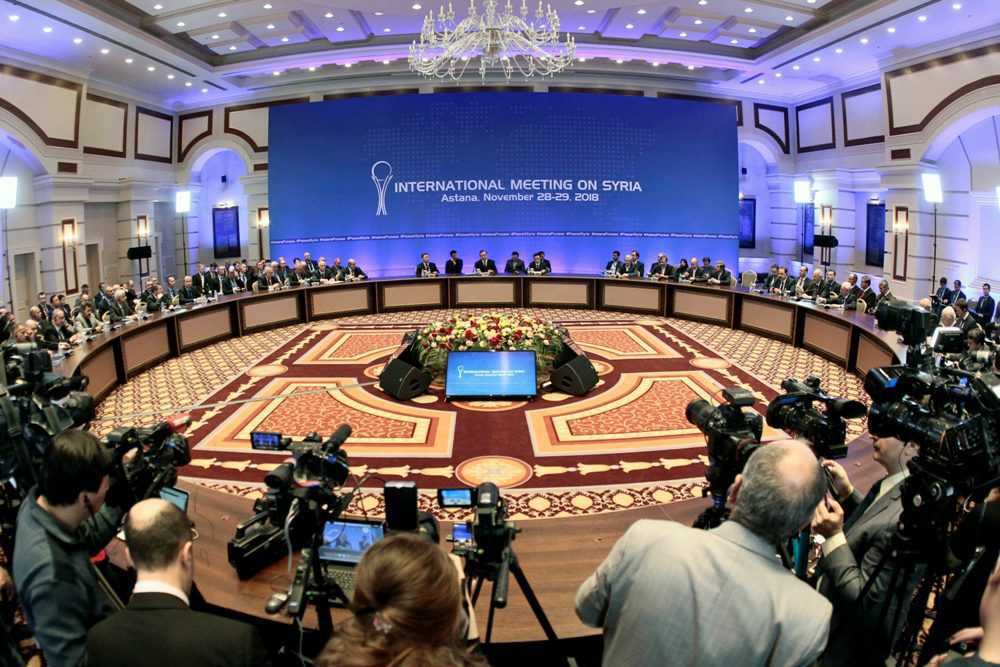Astana Talks placed three de-escalation zones under government control. Is Idlib next? (Timeline)
AMMAN- On August 1, 2019, the 13th round of the “Astana Process on Syrian Peace” (Astana Talks) convened in the capital of Kazakhstan, Astana with the Syrian opposition’s negotiating body, The Syrian Negotiation Commission (SNC), abstaining from participation in protest of the ongoing military campaign in Idlib.
18 August 2019
Kazakh Foreign Minister Kairat Abdrakhmanov, center, speaks during talks on Syria in Astana, Kazakhstan, 29/11/2018 (AFP)
AMMAN- On August 1, 2019, the 13th round of the “Astana Process on Syrian Peace” (Astana Talks) convened in the capital of Kazakhstan, Astana with the Syrian opposition’s negotiating body, The Syrian Negotiation Commission (SNC), abstaining from participation in protest of the ongoing military campaign in Idlib.
The conference was preceded by a severe military escalation by the Syrian government forces, as well as its allied militias and Russia, in the northern Hama and southern Idlib countryside. Since the beginning of the military campaign at the end of April, thousands of civilians have been killed or wounded, and hundreds of thousands have been displaced as a result of the systematic targeting of essential infrastructure and medical facilities.
On the first day of the Astana Talks, the attending parties announced that a ceasefire deal had been reached in Idlib governorate. However, the ceasefire only lasted the duration of the negotiations as Russia and the Syrian government resumed the military campaign with the same intensity once the talks concluded.
Idlib and the surrounding area, the countrysides of Hama, Latakia, and Aleppo—all of which were either controlled by or had a significant presence of the opposition militant groups—constituted one of three “de-escalation zones” established by an agreement between Iran, Russia and Turkey in Astana, May 2017. The two other zones included the Damascene suburb of eastern Ghouta and parts of the Homs governorate. While the fourth de-escalation zone was established in southern Syria (Daraa and Quneitra governorates) in a joint US-Russia deal in July 2017.
The stated objectives of the four de-escalation zones were to reduce military confrontations between the Syrian government and opposition forces, deliver aid to civilians, rebuild infrastructure and essential facilities, create conditions conducive to the voluntary return of refugees and displaced persons, and, ultimately, launch a political solution to the war in Syria.
However, as the 13th round of the Astana Talks convened, three of the four de-escalation zones have been wrested from opposition factions and were controlled by Damascus and its allied militias.
At the same time, more than three million civilians are suffering from alarming humanitarian and security conditions in the fourth de-escalation zone in Idlib. Hundreds of thousands are also being displaced, including those internally displaced persons (IDP) who were previously transferred from other de-escalation zones to the northwestern province in various political deals, constituting a contradiction of previous Astana agreements.
The spokesman for SNC, Dr. Yahya Aridi, believes that Russia “created what is called the Astana process with the goal of aborting the political transition,” referring to the “Geneva Communiqué” of June 2012, which later became the UN security council resolution 2254 in December 2015. It stipulated a political transition as a cornerstone of any future solution to the Syrian issue.
Also, Russia has added what is termed “confidence-building measures” to the latest rounds of Astana Talks, Aridi told Syria Direct. Such measures include prisoner releases, the lifting of sieges on besieged areas, and the delivery of aid [to residents in besieged areas]. However, “none of these have been implemented yet,” Aridi said.
The Syrian Network for Human Rights documented 33 mass killings committed by the Syrian government and Russia in the fourth de-escalation zone since April 26, which led to the killing of 781 civilians, of which 208 were children and 140 women.
It was this military escalation which prompted SNC to suspend its participation in the latest round of the Astana talks held earlier this month, the body’s chairman, Dr. Nasr Hariri, announced by tweet in July.
Russia’s participation in human rights violations committed against civilians in northwest Syria has demonstrated how it simultaneously plays two contradictory roles, acting as a guarantor party of Astana’s de-escalation agreement while continuing to conduct military operations, especially aerial bombing, alongside Syrian government forces.
Aridi also noted that: “If there were a political solution in Astana, then Russia [will] want to tailor it to its [desires] and the [desires] of the regime.” He reiterated that SNC is working “to resist any such thing since it does not see a political solution except through the Geneva process, and that ‘Astana’ [would be] the end of Geneva and the political settlement process.”







